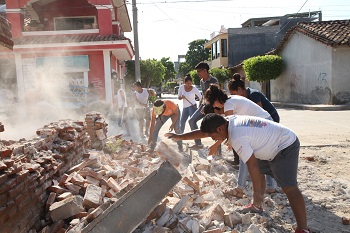Nearly 5,100 schools have been damaged or destroyed in Mexico following two powerful earthquakes that struck less than two weeks apart, threatening access to education for thousands of children, according to UNICEF.
Some seven million children live in areas affected by the earthquakes on September 8 and September 19. UNICEF is working with its partners in areas affected by the earthquakes to establish temporary schools, promote school safety guidelines, train teachers in psychosocial support, and distribute education supplies and early childhood development kits to teachers and caregivers.
“We are deeply concerned by the substantial damage sustained by schools in the hardest hit communities and the impact this could have for children,” said Christian Skoog, UNICEF Representative in Mexico.
“It is essential that we find urgent solutions to get them back in the classroom as quickly as possible, both to secure their futures and to help restore a sense of normalcy to their lives following these traumatic experiences.”

The children’s agency is also ramping up its response to meet the urgent health and protection needs of affected children, including:
– Construction of child-friendly spaces for children to play, recover and receive psychosocial support;
– Distribution of information on how to protect children during an earthquake and how to avoid accidental separation of families;
– Distribution of basic hygiene items and supplies such as soap, blankets, rainwear, and tarpaulins;
– Provision of clean drinking water and portable toilets in temporary shelters and outdoor camping sites.
UNICEF is appealing for US $4.6 million to support its humanitarian response to the earthquakes of September 8 and 19.
Original source: UNICEF
Posted on 23 September 2017

